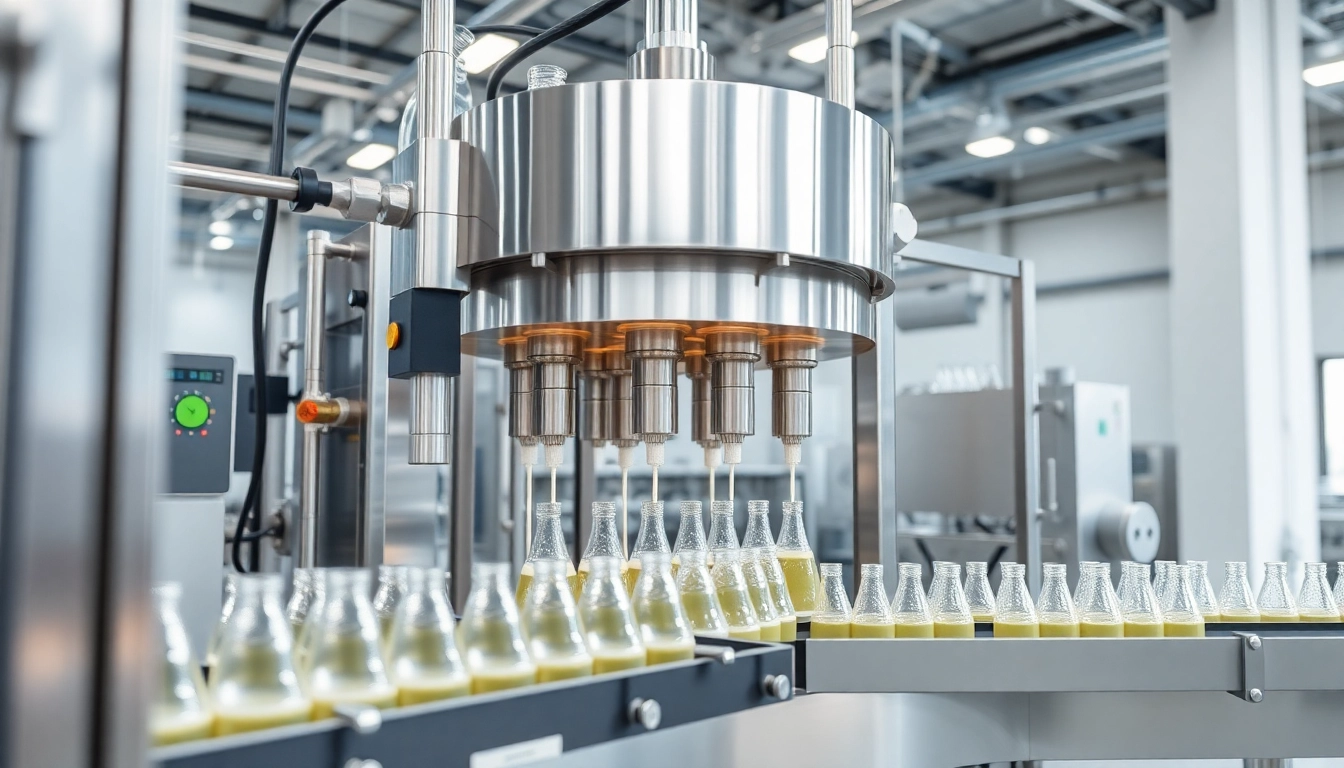Understanding Filling Machines
Definition and Purpose
Filling machines are vital equipment in various industries, specifically designed to fill containers with products, ranging from liquids to powders. Utilized prominently in manufacturing and packaging, these machines streamline operations by automating the filling process, thus enhancing efficiency and accuracy. The primary purpose of a filling machine is to dispense a precise volume of product into a container, ensuring quality control and reducing waste. Optimal performance from a reliable Filling Machine Supplier guarantees the integrity of the packaging process.
Types of Filling Machines
There are several types of filling machines, each tailored for specific applications.
- Gravity Fillers: Suitable for thinner liquids, these machines use gravity to fill containers under controlled conditions.
- Piston Fillers: Ideal for thicker products such as sauces and gels, piston fillers work by employing a piston to draw in and dispense the product.
- Pressure Fillers: Commonly used for carbonated beverages, these machines maintain pressure to prevent foaming during the filling process.
- Vacuum Fillers: Effective for viscous materials, vacuum fillers use a vacuum to help draw the product into containers efficiently.
- Auger Fillers: For powders and granules, auger fillers utilize a rotating screw to dispense a precise amount of material into the container.
How Filling Machines Work
The operational mechanism of filling machines varies by type, yet the general process includes the following steps:
- The container is positioned under the filling nozzles or valves.
- The machine engages its filling mechanism, starting the flow of product.
- The product fills the container to a predetermined level.
- Once filled, the machine moves the container away, and the cycle repeats for the next one.
Key Features of Quality Filling Machines
Precision and Accuracy
A top-tier filling machine must deliver consistent accuracy in filling amounts. Precision is critical to avoid underfilling or overfilling, which can lead to customer dissatisfaction and financial losses. High-quality machines often incorporate advanced sensors and programmable logic controllers (PLCs) to ensure fill accuracy settings.
Durability and Maintenance
The longevity and dependability of filling machines are directly tied to their construction quality. Robust materials enhance longevity, while user-friendly designs simplify maintenance. Regular cleaning and maintenance schedules are crucial for optimizing machine performance and preventing breakdowns, which can halt production.
Automation Levels
Filling machines can range from fully automated models, which require minimal human intervention, to semi-automated and manual models. Fully automated systems often include features such as conveyor belts, automatic container detection, and integrated capping and labeling solutions, thereby providing a streamlined filling process.
Choosing the Right Filling Machine Supplier
Evaluating Experience and Reputation
Choosing the right filling machine supplier necessitates thorough vetting. Assessing the supplier’s industry experience and reputation can provide insight into their reliability. Established suppliers often have a history of successful projects and satisfied customers, which can be verified through case studies and testimonials. It’s advisable to request references and compile a list of suppliers known for their quality and service.
Customer Support and Services
An excellent supplier provides not only equipment but also robust customer support services. Look for suppliers who offer training, technical assistance, and readily available spare parts. A responsive customer support team can significantly reduce downtime associated with malfunctions or when seeking to optimize machine performance.
Reviews and Testimonials
Reviews and testimonials from previous customers can reveal invaluable insights into a supplier’s performance and the quality of their machines. Platforms such as trade directories or review websites may include feedback that highlights strengths, weaknesses, and overall satisfaction levels. Additionally, direct communication with past clients can provide a clearer picture of expected service levels.
Application Industries for Filling Machines
Food and Beverage
The food and beverage industry is one of the primary users of filling machines, processing a diverse range of products including liquids, powders, and semi-solids. Filling machines in this sector must adhere to strict safety and hygiene standards. They are employed in bottling beverages, packaging sauces, and filling jarred food products, ensuring precision and consistency throughout the entire production line.
Pharmaceuticals
Pharmaceutical filling machines are designed to handle the sterile and delicate nature of drugs, ensuring no contamination occurs during the filling process. These machines are imperative for accurately dosing liquid medications into vials and syringes. The pharmaceutical sector often requires more sophisticated machinery that can integrate into a compliance framework, given the stringent regulations governing drug manufacturing.
Cosmetics and Chemicals
Cosmetic and chemical filling machines cater to a wide variety of products such as lotions, creams, and chemical agents. The machinery used in this industry often needs to be flexible, capable of handling different types of products and packaging formats. Customization options are critical in this industry to meet diverse consumer demands and brand requirements.
Future Trends in Filling Technology
Innovations in Automation
Automation is a continually evolving field within the filling machine market. Future trends highlight the introduction of AI and IoT technologies, allowing machines to monitor production processes in real-time and optimize performance. These innovations will enable predictive maintenance to reduce downtime and increase operational efficiency.
Sustainability in Packaging
With increasing environmental concerns, more filling machine manufacturers are focusing on sustainable practices. Sustainable filling machines are designed to minimize product waste, reduce energy consumption, and accommodate eco-friendly packaging materials. As consumers continue to demand greener solutions, suppliers who invest in sustainable technology will be better positioned in the market.
Technological Integration
Integration with other manufacturing systems is becoming more prevalent. The use of smart machines that communicate with packaging and inventory systems can improve the overall efficiency of production lines. Enhanced data collection from filling machines can provide insights into operation metrics, leading to continuous improvement initiatives and better decision-making processes.








